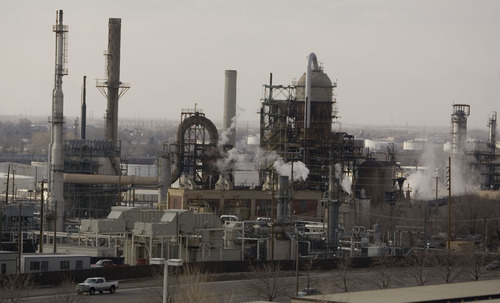This is an archived article that was published on sltrib.com in 2011, and information in the article may be outdated. It is provided only for personal research purposes and may not be reprinted.
Tesoro Corp. said Monday it plans to invest $180 million to expand crude oil processing at its Salt Lake City refinery.
The San Antonio, Texas-based refiner said the investment is expected to increase processing capacity at its 58,000 barrel-per-day Utah facility by 7 percent, or an additional 4,000 barrels per day.
The company employs about 250 at its Utah refinery, but a spokeswoman said she could not supply information Monday about how many jobs, if any, would be created by the expansion.
"This project is another example of our ability to invest our capital in high-return, short-payback projects," Tesoro President and CEO Greg Goff said in a conference call with securities analysts and investors.
Tesoro's expansion project will be undertaken in two stages that are scheduled for completion in 2013 and 2014.
Once completed, the Salt Lake City project is expected to produce another $100 million in earnings annually for Tesoro before accounting for income taxes, depreciation and other financial adjustments, Goff said.
The company said it still needs to get regulatory approval for the expansion and must conduct additional engineering work before construction of the Utah project can get under way.
One environmental group said it will be watching Tesoro closely.
"We'll have some real concerns if their plan results in any increase in air pollution," said Brian Moench of Utah Physicians for a Healthy Environment. "As a group, Utah's refineries are the second-largest industrial source of air pollution along the Wasatch Front. So we're going to have to look at their specs pretty closely."
Tesoro's planned Salt Lake City expansion will center on bringing additional capacity online to refine black-wax and yellow-wax crude produced in the Uinta Basin in eastern Utah.
Black-wax crude comes out of the ground at a consistency similar to petroleum jelly. It is thick and viscous, and unlike so-called light, sweet crudes that are popular feedstocks for refining, black-wax crude usually isn't transported by pipeline. It typically needs to be trucked by insulated tankers and must arrive at its destination within four to eight hours or it will solidify. If that happens, the tanker's cargo must be warmed up before it can be pumped out.
Tesoro spokeswoman Tina Barbee said once the expansion is completed, about 32 percent of the gasoline and diesel fuel produced from the Salt Lake refinery will come from black-wax or yellow-wax crude.
Utah's refineries primarily are set up to refine lighter, sweeter crudes, and that has proved problematic for many oil producers in the Uinta Basin, an area that holds a wealth of black-wax reserves.
Tesoro said that in conjunction with its SLC project it has entered into a crude oil supply agreement with Newfield Exploration Co. of The Woodlands, Texas, to provide 18,000 barrels of black-wax and yellow-wax crude oil beginning in 2013 from Newfield's Uinta Basin properties. The contract will run for seven years.
"Our centerpiece oil asset is the Uinta Basin, and today's agreement is a significant step toward securing the necessary oil-refining capacity to support our growth plans," Lee Boothby, Newfield's president and CEO, said in a statement.
Newfield said it expects to increase its exploration and production activities in eastern Utah next year and will run as many as eight drilling rigs, compared with five in years past.
Boothby said Newfield has been active in the Uinta Basin since 2004.
Twitter: @OberbeckBiz



